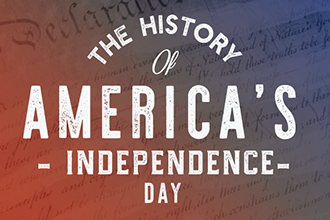"Taxation without representation!" was the battle cry in America’s 13 Colonies, which were forced to pay taxes to England's King George III despite having no representation in the British Parliament. As dissatisfaction grew, British troops were sent in to quell the early movement toward rebellion. Repeated attempts by the Colonists to resolve the crisis without military conflict proved fruitless. "Taxation without representation!" was the battle cry in America’s 13 Colonies, which were forced to pay taxes to England's King George III despite having no representation in the British Parliament. As dissatisfaction grew, British troops were sent in to quell the early movement toward rebellion. Repeated attempts by the Colonists to resolve the crisis without military conflict proved fruitless.
On June 11, 1776, the Colonies' Second Continental Congress met in Philadelphia and formed a committee whose express purpose was drafting a document that would formally sever their ties with Great Britain. The committee included Thomas Jefferson, Benjamin Franklin, John Adams, Roger Sherman and Robert R. Livingston. Jefferson, who was considered the strongest and most eloquent writer, crafted the original draft document. A total of 86 changes were made to his draft and the Continental Congress officially adopted the final version on July 4, 1776.
The following day, copies of the Declaration of Independence were distributed, and on July 6, The Pennsylvania Evening Post became the first newspaper to print the extraordinary document. The Declaration of Independence has since become our nation's most cherished symbol of liberty.1
We have power in numbers! Together, collaboration like that in the moving story above can spark great things. We are ESA and we are the voice of the electronic security and life safety industry. From all of us at the association, we hope you had a great Independence Day!




